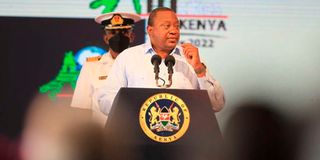Develop cities growth plan, Africa told

President Uhuru Kenyatta addresses delegates at the Africities Summit in Kisumu on May 17, 2022.
Africa has been advised to empower intermediary cities and municipalities to enhance development at grassroots level to stop them from depending on national governments.
This plea and a need to develop an African blueprint on urban growth dominated speeches during the opening of the ninth edition of the AfriCities Summit in Kisumu yesterday.
President Uhuru Kenyatta was at the opening ceremony.
Africans were also challenged to set up a dedicated fund to support development of infrastructure.
Speaker after speaker underscored the importance of cities, municipalities and local government structures in spurring socio-economic development.

A delegate makes his way into the Africities Summit at Jomo Kenyatta stadium in Kisumu yesterday. The five-day conference has attracted people from all over the world.
But even as the calls to governments to support towns develop, some speakers said it could come with the challenge of rural-urban migration.
United Cities and Local Governments of Africa (UCLG-A) Secretary General Jean-Pierre Elong Mbassi challenged African heads to have small cities as key targets of governance and development.
“The reality of Africa is exhibited in the manner in which governments treat intermediary cities,” Mbassi said.
“When you develop smaller cities, you make people take charge of and grow themselves.”
President Kenyatta called for tangible, practical and sustainable solutions to challenges facing towns.
He said it is not a task solely of governments but also of the civil society, policy experts, researchers, economic actors, academics, financial institutions as well as Africa’s development partners.
Mr Kenyatta added that local governments have proved to be an indispensable ring in the governance chain and an instrumental part in pandemic prevention and response actions.
“Time is ripe for scaling up the role of intermediary cities as the next frontiers of Africa’s urbanisation and development,” he said.
The President added that as focus is on unleashing the potential of intermediary cities, proponents must be aware of the growing urbanisation in Africa and the increasing rural urban migration.
That, he said, risks marginalising the growing population of rural Africa.

Traditional dancers entertain guests during the Ninth Edition of Africities Summit in Kisumu County on May 17, 2022.
“This calls for proper planning to create smart cities that meet future urbanisation challenges, plans that address the emerging need related to food security, shelter, environment conservation, health as well as infrastructure,” he said.
The President called for a comprehensive and achievable roadmap on how intermediary cities can contribute towards implementing Agenda 2030 of the United Nations and the African Union (AU) 2063 Agenda.
AU High Representative for Infrastructure Development, Raila Odinga, said relying on international and bilateral lenders presents the biggest challenge in the growth of most countries on the continent.
Mr Odinga said institutions should create a fund to lift Africa’s status.
“We should avoid expensive loans,” Mr Odinga said.
He added that every country can hive part of pension and insurance funds to contribute to the common pool.
Mr Odinga said the Lamu Port, South Sudan, Ethiopia, Transport Corridor (Lapsset) is a good example of a regional project that will connect remote areas of Africa.
“Unfortunately, lack of ownership has derailed completion of the project,” he said.
He said Africa needs at least $70 billion every year to develop roads, railways, airways, water, electricity and other infrastructure.
“Africa faces a deficit of $110 million. We need to look for ways of bridging the gap,” he said.
Mr Odinga said the installed energy capacity of Africa – a continent of a billion people – is 145GW, compared to South Korea’s 130GW yet the Asian country has 52 million inhabitants.
This, he said, is despite Africa having a huge potential for production.
He added that investment in infrastructure would boost the growing population as Africa is projected to have two billion people by 2050.
United Nations Habitat Executive Director, Maimunah Mohd Sharriff, said more than 64 per cent of the urban inhabitants on the continent live in slums.
“We must not abandon rural communities. We believe transformation will come from intermediary cities,” Ms Sharriff said.






